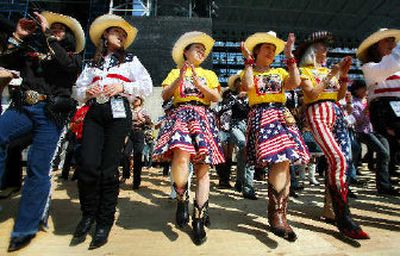Wild West in the East

KUMAMOTO, Japan – Yoshinao Tsuji has just one regret in life. He wanted to be born a cowboy.
He has the gear. The black leather chaps, order-made by Navajos in Arizona. He’s got the turquoise accessories. The boots, the big Stetson hat. For one month every year, he lives on a dude ranch.
“I love everything about horses,” he says, insisting on being called “Johnnie.” “If only I wasn’t a city boy from Kyoto.”
Johnnie isn’t alone.
Cowboys and cowgirls from across Japan turned out by the thousands recently for Country Gold, an annual event in the foothills of Mount Aso, a southern Japan landmark, that has become probably the biggest homage to the Wild West this side of Tucson.
The show had all the fixings of a real hoedown.
Miss Montana Rodeo had her own tent, where she spent the day signing autographs. There was a grub wagon, selling barbecue and beans on tin plates, an advertisement for recently unbanned American beef imports. And there was enough Jack Daniels flowing to fill a pool.
“It’s amazing,” Chris Wormer, a guitar player with the Charlie Daniels Band, said as he looked out from the stage into a sea of cowboy hats and bright bandanas. “These people are really into it.”
Japan’s country crowd is a decidedly older bunch.
The music is a big draw, but many of Japan’s Western wannabes say they were captured by country because they grew up on Western movies when they were kids, which places the demographic firmly in the 50-plus range.
“I just couldn’t get enough of the Westerns,” Johnnie, who is 63 and wears a long gray goatee, said as he saddled up his ride for a trot around the venue. “I knew that was the life for me.”
Another factor in the Japanese country scene’s small but devoted following is the tireless effort of one man – “Charlie” Nagatani, who founded the Country Gold festival 18 years ago and, with his band, the Cannonballs, is this country’s top country singer.
That isn’t really saying much.
Nagatani isn’t exactly a household name. Though he’s been playing country since 1956, he only has one CD, and it didn’t make much of a dent in the charts.
“I think it sold maybe 5,000 copies,” he said. “That’s total.”
But Nagatani knows how to throw a good shindig.
This year’s Country Gold event, held in an open-air arena 560 miles southwest of Tokyo, drew about 20,000 people.
“This isn’t just a Japan thing anymore,” Nagatani said at a welcoming party in his “saloon,” called – what else? – Good Time Charlie’s, where he regularly plays shows before a few dozen fans, on a good night. “This is now a major country-music event.”
Despite his obscurity in the mainstream music scene, Nagatani is about as close to the real deal as a Japanese country singer can get.
He has played 16 shows at the Grand Ole Opry in Nashville, toured the U.S. numerous times, done shows for American troops fighting in Vietnam, performed for Japanese royalty and was named the 1998 International Promoter of the Year by the Country Music Awards.
He claims to be an honorary citizen of 33 states.
“He just blew us away when we saw him the first time,” said the legendary country singer and fiddle player Charlie Daniels, who headlined this year’s Country Gold along with the girl band Cowboy Crush and the Grascals, an up-and-coming bluegrass troupe. “He came up on stage and bowed and looked very Japanese, and then he jumped right into ‘I Walk the Line’ and sounded just perfect.”
Of course, no hoedown would be complete without line dancing, and several hundred line dancers – many well into their 70s – converged on Country Gold.
“I love the music, I love turquoise, and I love the look,” said Chihiro Hall, who brought a team of line dancers halfway across Japan from Yokohama, which is just south of Tokyo. Her American husband, Eugene – a civilian contractor in Iraq – made a point of taking vacation so that he could be there, too.
“It’s a great time,” he said, beer in hand.